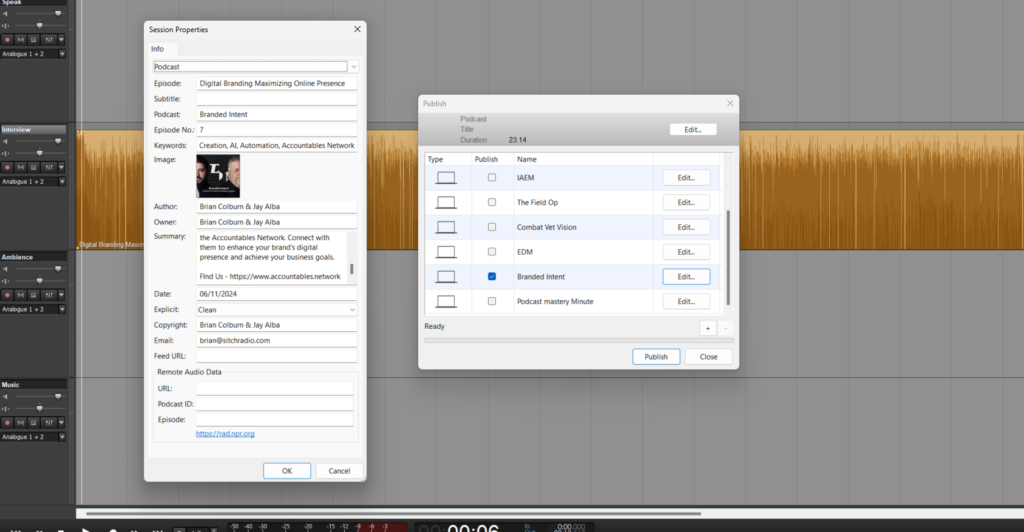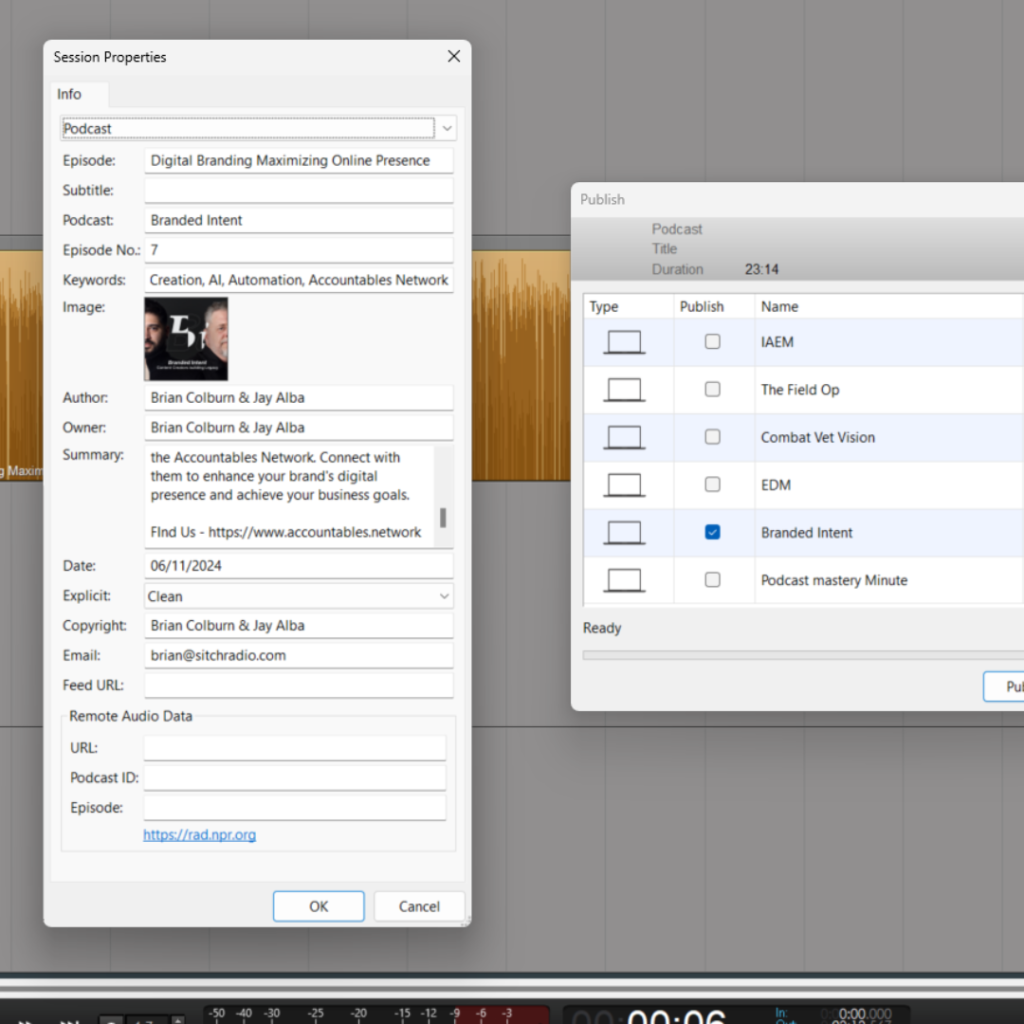The Importance of Publishing Files Properly with Metadata: A Guide for Podcasters

As a podcaster, you pour hours of hard work into creating compelling content. The process is meticulous, from researching topics to scripting, recording, editing, and finalizing your episodes. However, an often overlooked aspect can significantly impact your podcast’s discoverability and success. Correctly publishing your audio or video files with accurate metadata can be a game-changer. Let’s dive into what metadata is, how search engines use it, and why it’s crucial for the searchability of your content.
What is Metadata?

Metadata is data about data. Audio and video files include information such as the title, artist, album, genre, track number, and even cover art. In podcasting, metadata encompasses episode titles, descriptions, release dates, keywords, and more. This information is embedded within the file and can be accessed by media players and search engines.
Types of Metadata for Podcasts
- Basic Metadata: This includes the podcast title, episode title, author, and release date.
- Descriptive Metadata: Summaries or descriptions of the podcast and individual episodes.
- Administrative Metadata: Information such as rights, licensing, and creator details.
- Technical Metadata: File format, bit rate, duration, and other technical aspects.
- Embedded Metadata: Tags embedded directly into the audio or video file.
How Search Engines Use Metadata
Search engines like Google and Bing utilize metadata to understand and categorize content. When it comes to audio and video files, search engines crawl the metadata to:
- Index Content: Metadata helps search engines index your content accurately. Titles, descriptions, and keywords are scanned to determine the relevance of your content to search queries.
- Display Information: Metadata determines the information displayed when your podcast appears in search results. A well-crafted title and description can entice users to click on your link.
- Enhance Discoverability: Keywords in your metadata improve the chances of your podcast appearing in relevant search results. This is especially important for niche topics or less-known podcasts.
- Improve SEO: Proper metadata enhances your podcast’s search engine optimization (SEO). Well-optimized metadata can lead to higher search rankings and more organic traffic.
Why Metadata is Crucial for Podcast Searchability
- Enhanced Discoverability
You compete with thousands of other content creators when you publish a podcast episode. Proper metadata helps search engines understand what your episode is about, making it easier for potential listeners to find your content. For example, if your episode is about “sustainable living,” including keywords like “sustainability,” “eco-friendly,” and “green living” in your metadata can help attract listeners interested in those topics.
- Improved User Experience
Metadata doesn’t just help search engines; it also enhances the user experience. Accurate and detailed metadata allows media players and podcast directories to display relevant information about your episodes. This means listeners can quickly understand your episode, who is featured, and when it was released. A well-crafted episode description can be the deciding factor in whether someone chooses to listen to your podcast.
- Consistency and Professionalism
Consistent metadata practices contribute to a professional presentation. When your metadata is formatted correctly and detailed, it reflects the effort and quality of your podcast. It helps establish your brand and ensures your content is uniformly presented across various platforms.
- Legal and Rights Management
Proper administrative metadata helps manage rights and licensing information. This is crucial for protecting intellectual property and ensuring all contributors are appropriately credited.
- Analytics and Tracking
Metadata can include tracking codes that help you gather analytics on how your content is consumed. This data is invaluable for understanding your audience and refining your content strategy.
How to Add Metadata to Your Podcast Files
- Using Podcast Hosting Platforms
Most podcast hosting platforms, like Libsyn, Podbean, and Anchor, provide fields to enter metadata when uploading your episodes. Make sure to fill out all available fields, including episode title, description, author, and keywords.
- ID3 Tags for MP3 Files
If you publish audio files in MP3 format, you can use ID3 tags to embed metadata directly into the file. Software like Audacity, iTunes, and MP3Tag can help you add or edit ID3 tags.
- XML/RSS Feeds
Ensure your RSS feed includes detailed metadata. Podcast directories like Apple, Spotify, and Google Podcasts use this feed to pull your episode information. Include comprehensive and accurate data in your feed.
- Video Metadata
Use software like Adobe Premiere Pro or Final Cut Pro to add metadata for video podcasts. Ensure the title, description, keywords, and other relevant information are included.
Best Practices for Metadata Optimization
- Use Descriptive Titles
Your episode title should be clear and descriptive, giving potential listeners an idea of what to expect. Avoid overly long titles; aim for a balance between informativeness and brevity.
- Write Compelling Descriptions
An engaging episode description can attract listeners. Include a summary of the episode, key discussion points, and any notable guests. Use relevant keywords naturally within the description.
- Include Keywords
Incorporate relevant keywords in your titles, descriptions, and tags. Think about what terms your audience might use to search for your content. However, avoid keyword stuffing; it should read naturally.
- Keep it Consistent
Maintain consistency in your metadata across all episodes. Use a standard format for titles and descriptions. This helps with brand recognition and makes it easier for listeners to navigate your content.
- Regular Updates
Review and update your metadata regularly. If an episode is not performing well, consider tweaking the title or description. Stay up-to-date with SEO best practices to ensure your metadata is optimized.
Encouragement for Podcasters
Publishing your podcast with proper metadata might seem daunting, mainly when you’re focused on content creation. But think of metadata as the bridge that connects your hard work to the audience that needs it. Properly tagged files ensure your content is discoverable, presentable, and professional.
Remember, the world of podcasting is vast and competitive. By correctly managing your metadata, you’re enhancing your podcast’s discoverability and showing your commitment to quality and professionalism. It’s an investment in your podcast’s future, one that can lead to increased visibility, more listeners, and, ultimately, more tremendous success.
If you ever feel overwhelmed, remember that help is available. Brian Colburn, a leader in the podcasting world, emphasizes the importance of leveraging every tool at your disposal to maximize your podcast’s potential. Whether you’re just starting or looking to refine your approach, consider reaching out to experts or joining communities where you can learn and grow.
Your podcast has the potential to reach and inspire countless people. By ensuring your files are correctly published with accurate metadata, you are taking a significant step towards achieving that potential. Keep creating, keep sharing, and most importantly, keep believing in the impact of your voice. The world is ready to listen.




